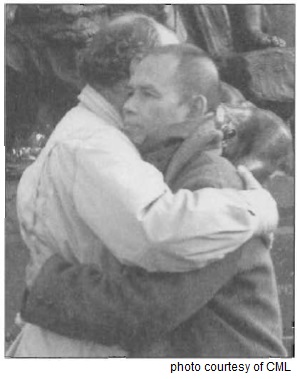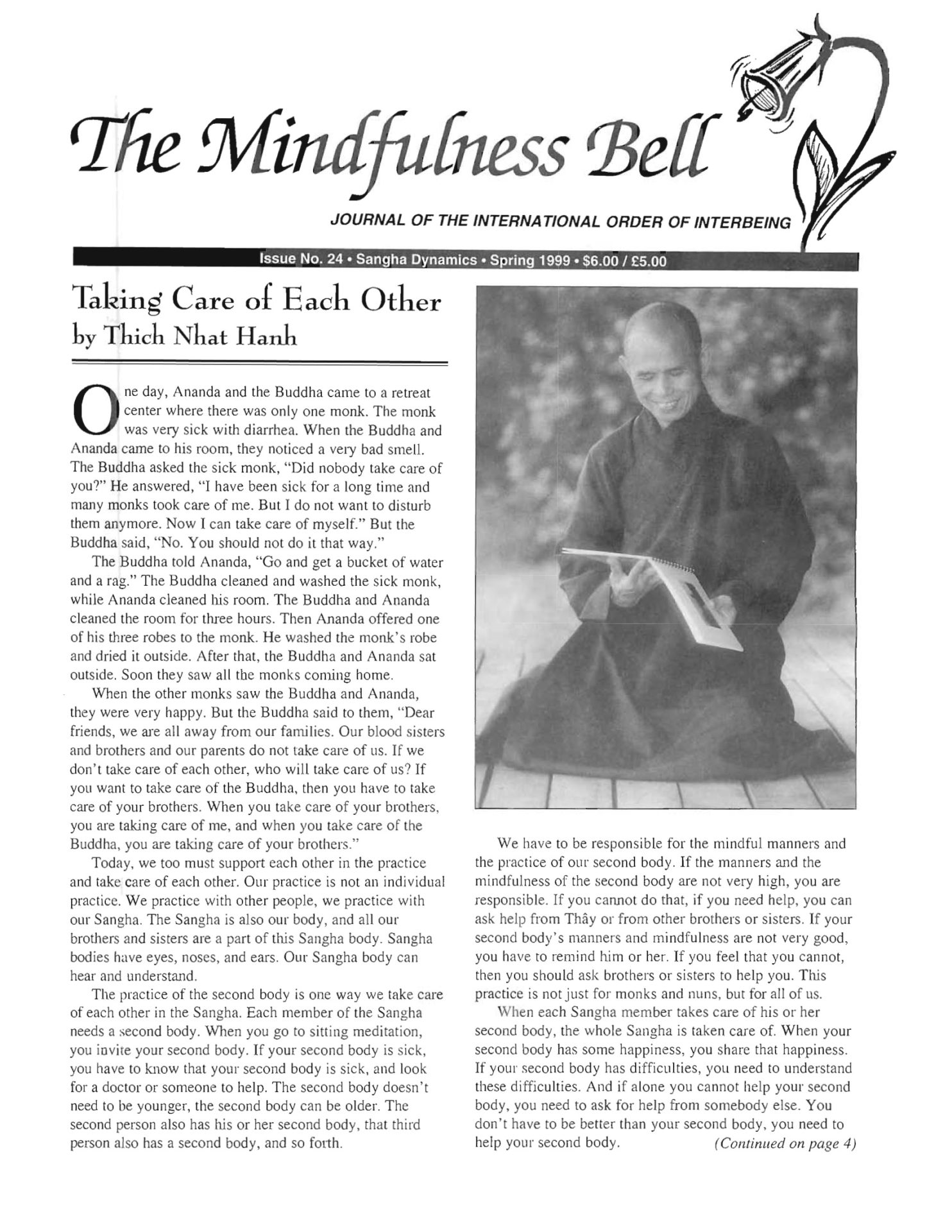By Fred Eppsteiner
Once again, our country is at war. Once again, violence is the solution nations and peoples choose to settle conflict. Yet, one of the hallmarks of the Buddha’s teaching is nonviolence. The first mindfulness training given by Shakyamuni Buddha was “Do not kill, do no harm, protect life.” As students of the Buddha, we must turn our mindfulness to the violence and incredible suffering occurring in the Balkans today.
As a traditional meditation discipline, mindfulness is an “inner practice.”
By Fred Eppsteiner
Once again, our country is at war. Once again, violence is the solution nations and peoples choose to settle conflict. Yet, one of the hallmarks of the Buddha's teaching is nonviolence. The first mindfulness training given by Shakyamuni Buddha was "Do not kill, do no harm, protect life." As students of the Buddha, we must turn our mindfulness to the violence and incredible suffering occurring in the Balkans today.
As a traditional meditation discipline, mindfulness is an "inner practice." We learn to be aware of the content of our minds-our thoughts, feelings, perceptions, and beliefs. But this distinction between internal and external is false. This mind that is aware of its own suffering and happiness is no different than the mind that is aware of the suffering and happiness of the world. The same mind looks within and without. We must be mindful of what is going on inside ourselves, but we must also turn our mindfulness outward, to the world.
The Buddha said, "Do not be violent in thought, speech or action." He knew that mind is the initial mover. Mind, speech, action-that's how things flow. When we look at what's going on in Yugoslavia, we can see that the current destruction was preceded by aggressive words, and that these words came from minds clouded by intolerance, fanaticism, and wrong view.

Today in the Balkans, violent intolerance is creating great suffering, but the world's violent response to the situation is also creating suffering. The earliest teachings of the Buddha stated that anger can never be stopped by more anger; hatred can never be stopped by more hatred, aggression can never be stopped by more aggression. Only through understanding, tolerance, deep listening, compassion, and lovingkindness can these negative mind states that lead to violence be stopped.
This revolutionary message is at the opposite pole of the political ideologies dealing with the Balkan situation. NATO forces are trying to end violence with more violence
The great American pacifist, A. J. Mustie said, "There is no way to peace, peace is the way." But the NATO alliance is seeking peace through war. Buddhism teaches that only when we become peaceful and nonviolent in body, speech, and mind can we create a truly peaceful and nonviolent world. There is no other way.
We need to look in mindfulness at this situation and ask, "What's really going on here? What are the real causes?" The media and politicians urge that time is of the essence, we must act quickly. But, we have to be very careful. In our personal lives, we may feel strongly called upon to act out anger and hurt or to use angry and attacking words at times. If we don't bring mindfulness to the situation, if we don't step back to see what's really going on, we'll never break the cycle of violence in ourselves or in the world.
Aggression may have immediate effect, but that's not the issue. For example, one can't tell parents who physically abuse their children that violence doesn't work, because they know if they smack their child for doing something they don't want him to do, he' ll probably stop. The real issue is the long-term damage violence does to the child. Hitting may stop the behavior, but very likely, it will also breed resentment and anger, and lead to aggressive behavior in the future. In the same way, bombing may stop aggression in the shOJi run, but does it really change anything? Violence only begets more violence. When there are winners and losers, the winners exult in their victories, and the losers, brooding with resentment, wait for their turn to be on top.
The Fourteen Mindfulness Trainings are relevant to the situation in Yugoslavia. At its core, the violence in this dispute arises from fanaticism and intolerance. Serbs versus Albanians, Christians versus Moslems, Orthodox versus Non-Orthodox. Each group intolerant of the other. The first three Mindfulness Trainings clearly identify causes of suffering: fanaticism and intolerance create suffering, attachment to views and wrong perceptions create suffering, imposing our views on others creates suffering.
The third training also reminds us of our responsibility "to help others renounce fanaticism and narrowness through compassionate dialogue." Is that what we've been doing in Yugoslavia for the past ten years? Have we poured our money and energy into Yugoslavia to help people learn to talk with one another or to develop programs to teach them how to understand each other? Now that there's a crisis, we spend hundreds and hundreds of millions of dollars to kill and destroy, which in no way touches the underlying problems. Yet, we never spent a penny to develop compassionate dialogue. We took no interest in teaching nonviolence, or helping people learn to get along with those who are different.
What is compassionate dialogue? It's what Thay calls deep listening. To walk in someone's shoes and really understand who they are, their fears and concerns. To be compassionate means to feel the suffering of others and to want to relieve it. If the Serbs were listening to the Albanians compassionately, they would have asked, "What is your problem? What are your concerns? What are your fears? What's making you angry? Tell me about your history." And the Albanians would listen to the Serbs and all of their concerns, fears, desires, and frustrations. They would listen to each other with a sense of understanding. With this understanding, I believe people would see their commonality instead of only differences. And out of seeing their shared humanness could come real peace.
We should also learn to practice compassionate dialogue within ourselves, to listen to those parts of ourselves that are angry or wounded, and to accept them. This practice is no different than learning to listen deeply to friends, family members, or work colleagues. When there is conflict and anger, we especially need to listen deeply to each other and enter into compassionate dialogue, so we can peacefully resolve all conflicts.
In the Tiep Hien Precepts, killing is not directly addressed until the Twelfth Mindfulness Training. The first eleven deal primarily with actions of mind and speech, because that's where killing begins. Intolerance, fanaticism, anger, and hatred are nurtured first by thoughts, then by violent speech, and finally, one acts.
Our Buddha nature is a nature of oneness, interdependence, and love. To get to the point of killing, we first have to dehumanize the enemy, to say they are unlike us and outside the pale of civilization. These thoughts and language do violence to another human being. We have to be very careful about language and thoughts, because only when we've dehumanized someone can we do violence to them and want to see them suffer. This is the very opposite of the heart of compassion. How could peace ever come out of this mind state?
The Twelfth Mindfulness Training says, "Aware that much suffering is caused by war and conflict, we are determined to cultivate nonviolence, understanding, and compassion in our daily lives, to promote peace education, mindful meditation, and reconciliation within families, communities, nations, and in the world. We are determined not to kill and not to let others kill. We will diligently practice deep looking with our own Sangha to discover better ways to protect life and prevent war." This Mindfulness Training gives us a technology of nonviolence, very different from the technology of war. It shows us there are clear, nonviolent ways to settle disputes and resolve conflicts, ways that preserve the integrity and humanity of the person we disagree with. There are ways of resolving conflict in which both sides come out feeling respected.
The ability to understand that people are products of their conditions does not mean that one doesn't act, perhaps even forcibly, against violence and evil in the world. But, the key to nonviolence is that one always acts out of love and understanding, not out of hatred. It doesn't mean we allow those who do violence and aggression to have their way. It means that when we act, we act out of understanding.
The lives of Gandhi and Martin Luther King, Jr. showed us how to act with understanding. They wisely taught us that hate deforms us and that nonviolent action is possible. The dualistic mind wants to say there are good people and there are bad, but in truth there is no good and bad, because those who are good today may be bad tomorrow. Today's victims are tomorrow's perpetrators. So it's often said that we must hate the crime, not the criminal, hate the deed, not the doer.
Only when we look deeply at the Balkan situation and identify with everybody, do we have the power to act wisely. When we act without seeing both sides, we get into trouble by seeking quick solutions. The ancient teaching of Buddhism calls us to the path of nonviolence, understanding, love, and peace. Our practice is not just about crossing our legs and turning within. We need to use our compassion to touch the suffering in the world.
This article was excerpted from a talk given by Dharma teacher Fred Eppsteiner, True Energy, at a Day of Mindfulness in Naples, Florida.

